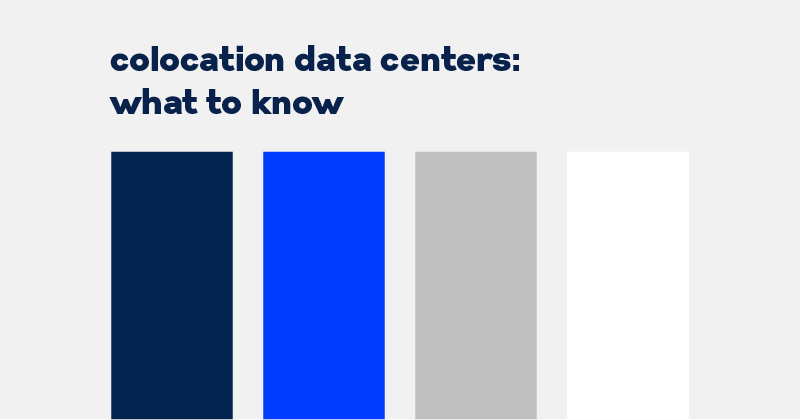Colocation, the Cloud and the Edge

Updated: January 28, 2023
With all the talk about the cloud, edge computing, and what a couple of computer science professors at the University of California Berkeley call “sky computing,” is colocation still relevant? The data centers that provide colocation services aren’t going anywhere and those services may be more important than ever.
Not all organizations have transitioned from on-premises to the cloud. Colocation offers an important step between the two environments – and serves a number of other important purposes as well.
Data Centers Enable the Cloud
First, it’s important to remember that the cloud can’t exist without data centers – also known as colocation facilities. The cloud is comprised of servers that power the compute and storage that enable software and services to run on the Internet instead of locally on computers. Those servers reside in data centers where they’re supplied with the power, cooling, and everything else needed to run them.
Edge Computing Requires Data Centers
Data centers also enable edge computing. These facilities are located in tier-two markets that have been traditionally underserved by data center and telecom providers where they provide carrier density or access to a critical mass of internet services, content, and networks.
True edge data centers and traditional colocation models are used to cache popular content or web applications closer to users. In effect, they extend the edge of the internet.
The Financial Benefits of Colocation
While some companies still feel the need to maintain their own on-premises data centers , many have found that doing so is no longer a good business decision. Running a data center is expensive and takes resources away from strategic initiatives like digital transformation. There are real estate costs and equipment costs – both in terms of purchase and maintenance. There are utility costs, labor costs, and much more. Why spend all so much money on something that can easily be outsourced?
Not surprisingly, one of the biggest benefits of colocation is trading out capital expenses for operating expenses. Colocation provides a predictable op-ex model that doesn’t require you to keep up with the escalating capital expenses of building, securing, and maintaining your own data center.
Given the continuing shortage of IT professionals and greater prioritization of initiatives like digital transformation, employing colocation also frees up limited staff resources to focus on other endeavors instead of maintaining equipment.
Power and Networking Benefits of Colocation
In addition, colocation facilities often provide access to a more robust power-per-square foot ratio than is commonly available in on-premises data centers. This allows you to better leverage innovations in virtualization and high-density computing.
Another benefit of colocation is that the data centers that provide colocation services typically offer multiple high-quality networking options. You have the flexibility to choose the ideal solution for your needs in a carrier-neutral setting. These facilities also employ high levels of security that many organizations aren’t able to supply on their own.
Colocation: The First Step to Hybrid IT
Yet another advantage of colocation is that it enables you to outsource selected workloads to a colocation facility. This gives you time to become comfortable in letting go of some of the day-to-day control of your IT assets. You maintain ownership of them but don’t have to invest in the facilities and labor to keep them in-house.
Collocating selected IT assets also helps make the transition to a hybrid IT model. A hybrid IT strategy encompasses any combination of on-premises, colocation, private cloud, and public cloud. The idea is to place workloads in the most appropriate environments.
Colocation can accommodate existing hardware, which you may need to keep for hosting legacy images or applications that can’t move to the cloud. Or you may need to keep them because of the investment already made.
Colocation with the right provider can also facilitate migration to the cloud. One of the issues with a hybrid IT strategy is that it requires advanced networking capabilities to move data between internal and external resources. Colocation providers that also offer cloud services typically have those capabilities in place. Because they enable you to put your non-cloud infrastructure in the same facility as your cloud systems, you take advantage of fast, reliable data movement between the two environments.
Access to a data center’s operator and interconnect networks also makes it easier and more cost-efficient to quickly move data over large geographical areas and between these assets. These private interconnects and specialized network systems get data to corporate WAN and LAN systems, adding a layer of security in how information is delivered.
The Benefits of Edge Colocation
Colocation can also play a role in enabling organizations to leverage the benefits of edge computing. Edge computing allows for moving the necessary resources closer to end-users, speeding up and improving the digital experience.
Edge hardware requires fewer resources than traditional colocation, but the distribution of the edge network must be managed by companies. To service the needs of companies that are unable to manage edge networks, edge colocation providers rent out dynamic server space and handle the infrastructure maintenance. This gives their customers more time to concentrate on hardware configuration, content, and applications.
Hybrid cloud frameworks like AWS Outposts and Azure Stack also make it easy to move workloads hosted in the public cloud to colocated infrastructure. The workload can still be deployed and managed like it was in the public cloud, yet is in closer geographic proximity to end-users.
Learn About Colocation Options
Colocation offers many benefits ─ and provides an easy way to connect to the cloud and deliver services at the edge. At the same time, it can help you meet changing business needs without throwing away your investment in existing IT assets.
To learn how to integrate colocation into your IT strategy, talk to US Signal. Our solution architects will be happy to review your existing IT service portfolio and discuss options for helping you optimize your assets—including colocation. Call 866.2. SIGNAL or email [email protected]



